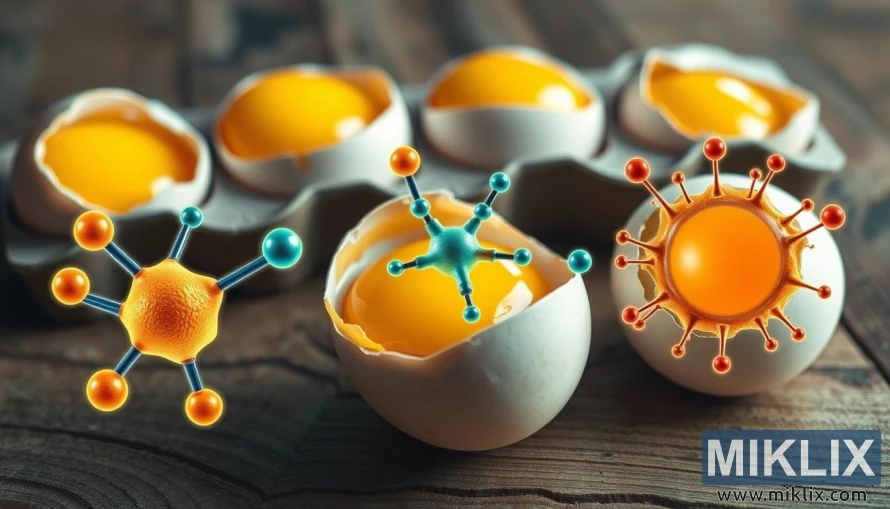Golden Yolks, Golden Benefits: The Health Perks of Eating Eggs
Published: May 15, 2025 at 1:26:24 PM UTC
Last updated: December 24, 2025 at 3:05:24 PM UTC
Eggs are a nutritional powerhouse, packed with vitamins and minerals. They are great for your health and can be part of any meal. Eating eggs can help your heart, manage weight, and build muscle. This article will dive into the health perks of eggs and how they fit into different diets.

Key Takeaways
- Eggs are nutrient-dense, packed with essential vitamins and minerals.
- They support heart health and help lower cholesterol levels.
- High protein in eggs aids in muscle growth and recovery.
- Eggs can aid in effective weight management strategies.
- Eggs are versatile and fit all dietary preferences.
- They offer specific health benefits for pregnant women.
Introduction to Eggs and Their Nutritional Value
Eggs, mainly from hens, are a favorite food worldwide. They fit well in many dishes, making them loved by many. Eggs are packed with nutrients that help keep us healthy.
Eggs are low in calories but high in good protein. They are a great choice for boosting your diet. They also have important vitamins and minerals like:
- Vitamin D
- Vitamin B12
- Choline
- Antioxidants
Studies show eggs are key to a balanced diet. They help us stay healthy, even though some thought they were bad for us. Now, experts say eggs are good for us, so we should eat them more often.
Incredibly Nutritious
Eggs are packed with nutrients, making them a key part of many diets. A large egg gives you a lot of good stuff. It has vitamin A, which is 8% of what you need daily, and vitamin B12, which is 23%.
Eggs also have riboflavin, which is 20% of what you need, and selenium, which is 28%. These are just a few of the many nutrients eggs offer.
But eggs aren't just about vitamins and minerals. They also have healthy fats that are good for you. If you get eggs from pasture-raised or omega-3 enriched hens, you get extra omega-3s. This makes eggs a great choice for getting lots of nutrients in one food.
High in Cholesterol but Not Necessarily Harmful
Each egg has about 186 mg of cholesterol. This has raised worries about heart health. Many think eating eggs could raise blood cholesterol levels.
But recent studies show dietary cholesterol doesn't greatly affect blood cholesterol for most people. The liver adjusts cholesterol production based on what we eat. For many, eggs in a balanced diet don't increase heart disease risk.
Knowing how dietary cholesterol works helps clear up egg myths. People can enjoy eggs without worrying about their cholesterol levels.

May Raise HDL (the “Good”) Cholesterol
Eating eggs can be good for your HDL cholesterol, also called "good" cholesterol. More HDL cholesterol means less risk of heart disease and stroke. Studies show that eating an egg a day can raise HDL levels in many people.
Eggs are more than just a number on a cholesterol test. They can make you healthier overall. Here are some key points:
- HDL cholesterol helps move cholesterol away from arteries and back to the liver.
- Good cholesterol and eggs in your diet help keep your heart healthy.
- Eating eggs regularly can improve your metabolism and lipid profiles.
Eggs are Linked to a Reduced Risk of Heart Disease
The link between eggs and heart health is fascinating. Studies show that adding eggs to your diet might help your heart. Eating eggs in moderation can be part of a healthy diet. They may help make LDL particles bigger and less harmful, which is good for your heart.
To fully understand eggs' benefits for the heart, we need more research. Some studies suggest eggs are good for heart health, but others are not so sure. So, we need more studies to be sure. Adding eggs to a balanced diet can bring many nutrients and help with heart disease risks.
Contain Lutein and Zeaxanthin For Eye Health
Eggs are packed with lutein and zeaxanthin, key for eye health. These antioxidants help block harmful blue light and fight oxidative stress. This keeps your eyes healthy as you age.
These nutrients in eggs are better absorbed with the fat they contain. This makes eggs a top choice for eye health compared to many plant-based foods. Adding eggs to your diet can help prevent cataracts and macular degeneration.

Omega-3 or Pastured Eggs Lower Triglycerides
Eggs from hens fed omega-3-rich diets or raised outdoors have more omega-3s. These fats are good for your heart and help control triglycerides. High triglycerides can increase heart disease risk, so finding good food sources is key.
Many studies show that eating omega-3 eggs can lower blood triglycerides. This is good for your heart and might have other health benefits. Pastured eggs also offer more than just omega-3s, making your diet healthier. Here are some benefits:
- Higher nutrient levels compared to conventional eggs
- Improved omega-3 fatty acid profile
- Enhancement of overall heart health
Choosing omega-3 or pastured eggs is an easy way to get more essential fats. It also helps your triglycerides and overall health. These choices make your diet more nutritious and balanced.
High-Quality Protein and Essential Amino Acids in Eggs
A large egg has about 6 grams of high-quality protein. It has all nine essential amino acids in the right amounts. This makes eggs a top choice for protein in our diet.
Eggs are also great for muscle growth and recovery. They are easy to add to many meals. This makes them a versatile option for anyone looking to boost their protein intake.
Compared to other protein sources, eggs are very nutrient-dense but low in calories. This is good for those who want to eat more protein without gaining weight. Eating eggs can also help you feel full longer, which is good for weight management.
Adding eggs to your diet can be very beneficial. Here are some reasons why:
- They are a complete source of protein, important for our body's functions
- They help grow and repair muscles after exercise
- They keep our energy levels up all day
Eggs as a Satiating Food for Weight Management
Eggs are great for those trying to manage their weight because they're full of protein. Studies show eggs can make you feel fuller than many breakfast foods. This can help you eat fewer calories later in the day.
Eggs are also good for keeping you full, which helps with weight control. They're easy to add to many meals. Here's why eggs are good for managing your weight:
- Rich in protein, which supports muscle maintenance and fat loss.
- They can help you consume fewer calories overall.
- Flexible and easy to incorporate into various meals.
- Offer a combination of essential nutrients that promote overall well-being.
Eggs help you feel full for longer, which is key for weight management. You can enjoy them in many ways. This makes it easier to follow your diet and live a healthy life.
Versatile Food for All Ages
Eggs are a great food for people of all ages. They are packed with nutrients, making them perfect for kids. Eggs help kids grow strong and healthy, thanks to their protein and vitamins.
Older adults also benefit from eggs. They are a good source of protein without too many calories. This helps keep muscles strong without adding extra weight. Cooking eggs can be fun, from simple dishes to fancy frittatas.
Eggs are super versatile in the kitchen. You can add them to breakfast, lunch, dinner, or even snacks. They are affordable and full of nutrients, making them a favorite for many. This means everyone can enjoy the benefits of eggs.
Health Benefits of Eggs for Pregnant Women
Nutrition is key for pregnant women to stay healthy and support their baby's growth. Choline is a vital nutrient found in eggs. It helps meet the body's needs during pregnancy.
Choline is important for brain development and the baby's health. Studies show it can improve cognitive skills and lower the risk of developmental problems. Eggs are a tasty way for pregnant women to get this essential nutrient.
Eggs also offer high-quality protein, vitamins, and minerals. These are good for both the mother and the baby. Adding eggs to meals can help keep the pregnancy balanced and healthy.
Potential Risks Associated with Egg Consumption
Eggs are good for us, but there are risks to consider. Eating raw or undercooked eggs can be dangerous. This is because they might have harmful bacteria like salmonella.
Salmonella is a big worry for people with weak immune systems or certain health issues. It's important to cook eggs well to avoid this risk.
For families with young kids, older adults, or pregnant women, egg safety is critical. Cooking eggs thoroughly can help keep them safe to eat. Some people with high cholesterol should eat eggs in moderation.
Knowing about these risks helps us make smart choices about eggs. This way, we can enjoy them safely and stay healthy.

Global Perspectives on Egg Consumption
Eggs are a key part of many cultures worldwide. In the United States, they're a big hit in breakfast foods like omelets. Countries like Mexico and China eat even more eggs, showing how important they are in their cooking.
The way people eat eggs varies a lot. It's shaped by local traditions, money, and what people like to eat. In some places, eggs are a cheap and reliable source of protein. They help meet nutritional needs, even in areas where food is scarce.
Eggs are used in many different ways across the world. They go from simple boiled eggs to complex dishes. Understanding the role of eggs in health and culture can help improve public health. Teaching about eggs' benefits can fight malnutrition and inspire new recipes.
Eggs and Sustainability
Eggs are becoming more popular as a sustainable protein choice. They have a lower environmental impact compared to other animal products. Modern egg farming practices help reduce waste and use resources wisely.
Sustainable egg farming meets the need for protein and eco-friendly food. Farms are focusing on hens' welfare and lowering carbon footprints. This appeals to people who want to help the planet with their food choices.
Key benefits of sustainable egg farming include:
- Lower greenhouse gas emissions
- Efficient feed conversion rates
- Improved animal welfare standards
- Access to healthy and affordable protein
As more people choose sustainable eggs, they support better farming practices. Choosing eggs wisely benefits both our health and the environment.
Conclusion
Eggs are a great addition to any diet, bringing many health benefits. They are full of nutrients, protein, and good compounds. This makes them a top choice for improving health.
Eggs help keep your heart healthy and are easy to cook. They are also very versatile. This makes them a great option for anyone looking to eat healthier.
When you eat eggs, it's important to think about their good points and any concerns. Eggs have cholesterol, but they also have lots of good stuff. By choosing eggs wisely, you can make your diet tasty and full of nutrients.
Eggs are a key part of a healthy lifestyle. You can eat them in many ways, like scrambled or in baked goods. Adding eggs to your meals is a simple way to get more nutrients and stay healthy.

Further Reading
If you enjoyed this post, you may also like these suggestions:
- Unlocking Cognitive Clarity: The Remarkable Benefits of Lion’s Mane Mushroom Supplements
- Sippable Wellness: The Surprising Benefits of Drinking Kefir
- The Mighty Macadamia: Small Nut, Big Benefits
